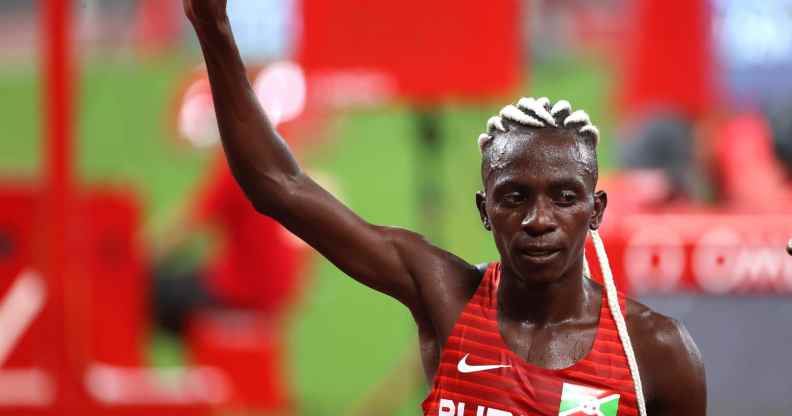Olympian who bounced back from testosterone ‘discrimination’ disqualified on technicality

TOKYO, JAPAN – JULY 30: Francine Niyonsaba of Team Burundi reacts after crossing the finish line during round one of the Women’s 5000 meters on day seven of the Tokyo 2020 Olympic Games at Olympic Stadium on July 30, 2021 in Tokyo, Japan. (Photo by Abbie Parr/Getty Images)
On Friday (30 July), Burundian athlete Francine Niyonsaba thought she’d achieved fourth place in a qualifying heat for the 5000m finals at the Tokyo Olympics.
Yet after the gruelling race, Niyonsaba was informed by a journalist at the finishing line that she had been disqualified for “lane infringement”, having stumbled briefly during an early part of the run.
The disappointment comes after a years-long battle with athletics officials, during which Niyonsaba has had her medical records leaked to press.
When it was revealed that Niyonsaba has hyperandrogenism, an intersex (also known as ‘DSD’, Differences in Sex Development) condition which causes naturally high testosterone levels in the body, she was barred from competing in the women’s 800m race. This was after she won a silver medal at Rio in 2016.
In this context, Niyonsaba saw Friday as a return to form, yet she didn’t learn of her disqualification until she had crossed the finishing line and spoken to journalists.
“My dreams of making it to the final were crushed,” she later wrote in a statement shared to social media. “Where was the Burundian team leader when I needed him by my side? USA challenged the disqualification of their mixed relay team and won. Why could Burundi not do the same for me? I felt so alone, unsupported.”
#BurundianOlympicCommittee #Burundian AthleticsFederation pic.twitter.com/b9s8MPPuaF
— Francine Niyonsaba (@FrancineNiyons4) July 30, 2021
The heartbreaking exchange was originally published by the French-language outlet La Presse.
Initially, Niyonsaba interviewed as though she had qualified, and gave a moving speech about her desire to uplift and encourage young girls to achieve. “I want to inspire little girls like me, especially across Africa, but also around the world,” she said.
Moments later, the journalist informed her she had been disqualified, at which point she turned to the screen and fell silent. After attempting to appeal her case across a language barrier with a Tokyo official to no avail, Niyonsaba was escorted out of the stadium.
Niyonsaba was previously targeted by the World Athletics’ testosterone regulations
All three medalists – Niyonsaba, Caster Semenya and Margaret Wambui – of the 2016 Rio Olympics women’s 800m race have been targeted by rules on sex verification, which bar women if their bodies are deemed to naturally produce “too much” testosterone.
These athletes are then faced with a choice: undergo treatment to artificially lower their testosterone levels, compete in the men’s event or choose instead to compete in longer-distance running events, where rules around testosterone levels are more relaxed.
Niyonsaba essentially retrained entirely to excel at longer-distance running, yet still found herself disqualified on a technicality with nobody to aid her appeal.
This isn’t the first time Olympic regulations have come under fire. Last year, the London School of Economics published a report arguing that rules around hormones use “sex, race and gender to restrict womanhood”, resulting in discrimination against trans women and women of colour in particular.
Similarly, the treatment of Caster Semenya sparked debate around the Eurocentricity of these requirements, as well as their exclusion of trans and intersex athletes.
“I didn’t choose to be born like this,” Niyonsaba said in a statement to Olympics News. “For me, it’s about discrimination. It doesn’t make sense.”

